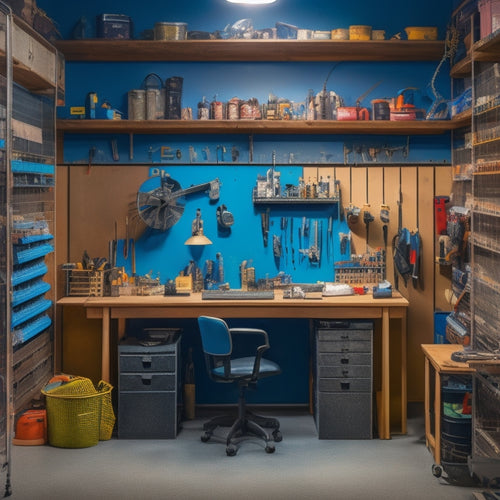
Mastering Woodworking Project Schedules: 5 Essential Tips
Share
When it comes to mastering woodworking project schedules, you need to set realistic deadlines, break down complex tasks, and assign them to focused work sessions. Be honest about your skill level and prioritize tasks effectively. Pad your timeline for unexpected delays and regularly monitor progress to stay on track. By following these vital tips, you'll be more likely to complete your projects and avoid the frustration of abandonment. To bring your woodworking vision to life, it's essential to get a handle on your project schedule - and with the right strategies, you'll be well on your way to achieving your goals.
Key Takeaways
• Assess the complexity of your woodworking project to create a realistic schedule and avoid underestimating task duration.
• Break down large projects into smaller, manageable tasks to maintain focus and make steady progress.
• Assign specific tasks to dedicated work sessions, considering energy levels, skill levels, and available resources for optimal efficiency.
• Pad your project timeline to absorb unexpected delays, and regularly reassess progress to stay on track.
• Regularly track project progress, identifying potential issues early, and make adjustments to meet project goals and deadlines.
Set Realistic Project Deadlines
How do you determine a realistic deadline for your woodworking project, considering the complexity of the task, your skill level, and the time you can dedicate to it? Setting a realistic deadline is pivotal to avoid frustration and make sure you stay motivated throughout the project.
To do this, you need to assess the task's complexity, your skill level, and the time you can allocate to it. Effective time management is key. Break down your project into smaller tasks and estimate the time required for each task.
Be honest about your skill level and don't underestimate the time needed for tasks that are new to you. Prioritizing tasks is also essential. Focus on the most important tasks first, and allocate your most productive hours to them.
Consider your availability and schedule tasks accordingly. If you can only dedicate a few hours a week to your project, don't set an unrealistic deadline that you can't meet.
Break Down Complex Tasks
Once you've set a realistic deadline, it's time to dissect complex tasks into manageable chunks, allowing you to tackle each component with confidence and precision. This is where task prioritization comes into play. By breaking down complex tasks, you'll be able to identify the most critical components that require your attention first.
Here are some tips to help you break down complex tasks:
-
Identify the main objective of the task and work backward to create a list of smaller tasks
-
Determine the resources and materials needed for each smaller task
-
Estimate the time required for each smaller task and allocate accordingly
-
Create a checklist to track your progress and stay on top of each task
-
Consider delegating or outsourcing tasks that are outside your expertise or take up too much of your time
Assign Tasks to Work Sessions
With your task list in hand, assign specific tasks to dedicated work sessions, guaranteeing each session has a clear objective and a realistic time frame for completion. This approach will help you stay focused and maintain momentum throughout the project.
For each work session, identify the most important tasks that require attention, and group similar tasks together to maximize efficiency. Consider your energy levels, skill level, and available resources when scheduling tasks. Assign more challenging tasks to sessions when you're most alert and focused, and save less demanding tasks for when you need a break.
Effective time management is essential here, as you want to make sure each session is productive and yields tangible results. By doing so, you'll optimize your work efficiency, completing tasks quickly and effectively, and ultimately, staying on track to meet your project deadline.
Allow for Unexpected Delays
As you schedule your woodworking project, build in buffers to account for unexpected setbacks, recognizing that even the best-laid plans can go awry due to factors beyond your control. Life is unpredictable, and unexpected delays can arise from tool breakdowns, material shortages, or even personal emergencies. To avoid project stagnation, prioritize flexibility in your schedule.
Here are some strategies to help you cope with unexpected delays:
-
Identify potential roadblocks: Anticipate potential setbacks and have a plan B in place.
-
Pad your timeline: Add extra time to your project schedule to absorb unexpected delays.
-
Communicate with stakeholders: Inform clients, suppliers, or collaborators about any changes to the project timeline.
-
Reassess and adjust: Regularly review your project progress and adjust your schedule as needed.
-
Stay organized: Keep all project documents and materials organized, making it easier to get back on track when delays occur.
Monitor Progress Regularly
Regularly tracking your project's progress helps you stay focused, identify potential issues early, and make adjustments to guarantee you're meeting your woodworking project's goals and deadlines. By monitoring your progress, you'll be able to identify areas where you're falling behind and make adjustments to your schedule accordingly. This is vital in time management, as it allows you to allocate your time more efficiently and make the most of your woodworking sessions.
To effectively track your progress, set aside time each day or week to review your project's status. Compare your actual progress to your schedule and make notes on any discrepancies. This will help you identify patterns or areas where you need to improve. You can use a project management tool or simply keep a journal to track your progress. The key is to make it a habit and be consistent.
Frequently Asked Questions
How Do I Handle Family Member Requests to Use My Workshop Space?
You're like a referee in a wrestling match, juggling family requests to use your workshop space. Set clear workshop boundaries, prioritize your projects, and manage your time effectively to avoid conflicts and maintain your sanity.
What if I'm Working on Multiple Projects With Different Deadlines?
When juggling multiple projects with different deadlines, you're prioritizing projects by urgency and importance, managing your time effectively to meet each deadline, and coordinating project coordination to avoid last-minute chaos.
Can I Really Make a Living Solely From Woodworking Projects?
You can make a living from woodworking projects if you secure a sustainable woodworking income by understanding market demand and implementing effective pricing strategies that balance your costs with customer willingness to pay.
How Do I Account for Changes in Material Availability or Cost?
When material availability or costs change, you'll need to make budgeting adjustments by reassessing your project's financials and exploring alternative material sourcing strategies to stay on track and guarantee profitability.
What's the Best Way to Store and Organize Project Schedules Digitally?
"Like a master builder, you'll construct a solid foundation for your project schedules by storing them digitally. Utilize time management software tools and cloud storage for seamless project tracking, ensuring you're always on top of your woodworking game."
Related Posts
-

Best Organizing Tools for a Clutter-Free Space
You're on a mission to change your cluttered space into a peaceful oasis, and you're looking for the best organizing ...
-

3 Simple Steps to a Garage Tool Wall You'll Love
To create a garage tool wall you'll love, start by planning the space, taking inventory of your tools, and measuring ...
-

3 Key Steps to Streamline Your Workshop Organization
You're likely wasting 30% of your workshop's productivity and profitability due to disorganization, a common problem ...


